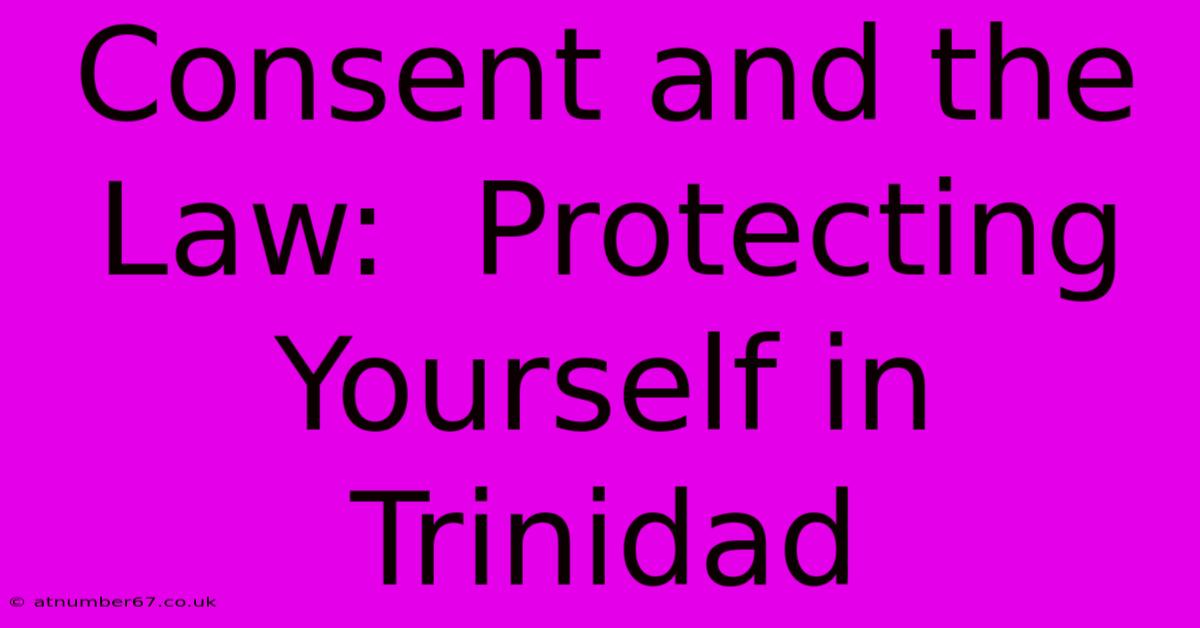Consent And The Law: Protecting Yourself In Trinidad

Table of Contents
Consent and the Law: Protecting Yourself in Trinidad and Tobago
Understanding consent is crucial in Trinidad and Tobago, impacting various aspects of life, from everyday interactions to serious legal matters. This article explores the legal framework surrounding consent in Trinidad and Tobago, focusing on how to protect yourself in different situations.
What is Consent?
Consent, in its simplest form, means freely and voluntarily agreeing to something. It's not just the absence of "no," but an affirmative "yes." Crucially, consent can be withdrawn at any time. This applies to a wide range of situations, including:
- Sexual activity: This is arguably the most important area where consent is paramount. Any sexual act without enthusiastic consent is illegal and constitutes sexual assault or rape. Silence, passivity, or intoxication do not constitute consent.
- Medical procedures: Before any medical treatment, informed consent is required. This means you must understand the procedure, its risks, and alternatives before agreeing to it.
- Data collection: Companies and organizations must obtain your consent before collecting, using, or sharing your personal data. This is especially relevant in the digital age with the prevalence of online privacy concerns.
- Photography and filming: Taking photos or videos of someone requires their explicit consent, especially in situations where they have a reasonable expectation of privacy.
The Legal Framework in Trinidad and Tobago
Trinidad and Tobago's laws reflect the importance of consent. Specific legislation addresses different areas:
- Sexual Offences Act: This Act defines various sexual offences, including rape and sexual assault, all of which require the prosecution to prove the absence of consent. The burden of proof lies with the prosecution to demonstrate that the act was non-consensual.
- Data Protection Act: This act safeguards personal data and requires organizations to obtain consent before collecting and processing personal information. Violation of this Act can lead to significant penalties.
- Tort Law: Civil actions for battery or assault can be brought where consent is lacking, allowing for compensation for harm suffered.
Situations Requiring Explicit Consent:
- Sharing intimate images: Distributing intimate images or videos of someone without their explicit consent is a criminal offence, carrying severe penalties. “Revenge porn” is a serious issue addressed by the law.
- Touching: Any unwanted physical contact constitutes assault. This includes unwanted hugs, kisses, or even a hand on the shoulder.
- Entering private property: You need permission before entering someone's home or private property.
Protecting Yourself: Practical Steps
- Be assertive: Clearly and directly communicate your boundaries and preferences. Don't feel pressured to do anything you're uncomfortable with.
- Say "no": Learn to say no firmly and confidently. Your "no" should always be respected.
- Document everything: If you believe consent has been violated, document the incident, including dates, times, witnesses, and any evidence.
- Seek help: If you've experienced a violation of consent, seek help from the police, a support organization, or a legal professional. The Trinidad and Tobago Police Service and several NGOs offer support for victims of sexual assault and other violations.
- Understand the law: Familiarize yourself with the relevant laws surrounding consent in Trinidad and Tobago. Knowing your rights is crucial to protecting yourself.
Consent: A Continuous Dialogue
Consent is not a one-time event; it's an ongoing process. It must be freely given, enthusiastically expressed, and can be withdrawn at any point. Promoting a culture of respect and understanding consent is crucial for a safer and more just society in Trinidad and Tobago. Open communication and education are key to preventing violations and ensuring everyone's rights are protected. Remember, your safety and wellbeing are paramount. Don't hesitate to seek help if you need it.
Disclaimer: This article provides general information and should not be considered legal advice. For specific legal advice, consult a qualified legal professional in Trinidad and Tobago.

Thank you for visiting our website wich cover about Consent And The Law: Protecting Yourself In Trinidad. We hope the information provided has been useful to you. Feel free to contact us if you have any questions or need further assistance. See you next time and dont miss to bookmark.
Featured Posts
-
The Bond Between Mahima Chaudhary And Her Daughter
Apr 06, 2025
-
Michael Polansky Age Doesnt Define Him
Apr 06, 2025
-
Understanding The Significance Of Daughter In Bengali
Apr 06, 2025
-
Margot Robbie The Impact Of Her Mother
Apr 06, 2025
-
Decoding Ciaras Age Youthful Secrets Revealed
Apr 06, 2025
